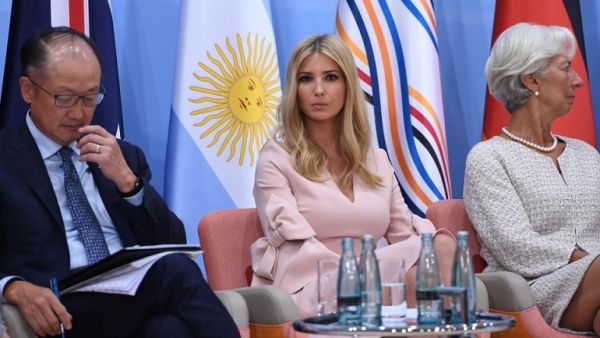On the occasion of the G20 summit, the World Bank Group announced on Saturday the creation of an innovative new facility that aims to enable more than $1 billion to advance women’s entrepreneurship and help women in developing countries gain increased access to the finance, markets, and networks necessary to start and grow a business.
The United States initiated the idea for the facility and will serve as a founding member along with other donor countries.
"This incredible facility will have a significant impact on women's economic development around the world," US President Donald Trump said. "It will help increase opportunities and economic growth while addressing unique barriers women entrepreneurs face. I am proud the United States is helping to lead support of this unprecedented initiative."
"Women’s economic empowerment is critical to achieve the inclusive economic growth required to end extreme poverty, which is why it has been such a longstanding priority for us," World Bank Group President Jim Yong Kim said. "This new facility offers an unprecedented opportunity to harness both the public and private sectors to open new doors of opportunity for women entrepreneurs and women-owned firms in developing countries around the globe."
"I am happy that this initiative for women presents real added value. We can see from the example of this Women’s Entrepreneurs Finance Initiative that the G20 is not just a two-day Summit, but that the G20 is a process" Chancellor Merkel of Germany said. "And I don’t have the slightest doubt that under the leadership of Jim Kim that these will be truly valuable and productive investments."
The Women Entrepreneurs Finance Initiative (We-Fi), the first World Bank-led facility to advance women’s entrepreneurship at this scale, will work to enable more than $1 billion of financing to improve access to capital, provide technical assistance, and invest in other projects and programs that support women and women-led SMEs in World Bank Group client countries. The goal of the facility is to leverage donor grant funding – currently over US$325 million – to unlock more than $1 billion in IFI and commercial financing by working with financial intermediaries, funds, and other market actors.
"It’s remarkable how quickly the international community has mobilized support for this new initiative, which has exceeded our target by nearly $100 million," Kim said. "This demonstrates not only the importance of increasing women’s economic empowerment, but it scales up our efforts to help women open and grow businesses. We’re grateful to President Trump, Chancellor Merkel, and Ivanka Trump for being such strong champions of this facility and the broader cause of women’s entrepreneurship."
Women entrepreneurs face numerous challenges to financing, owning, and growing a business, including limited access to capital and technology, a lack of networks and knowledge resources, and legal and policy obstacles to business ownership and development.
One of the major constraints limiting female-led enterprises is access to financial services. Nearly 70 percent of women-owned SMEs in developing countries are either shut out by financial institutions or are unable to receive financial services on adequate terms to meet their needs.
It is estimated that women-owned entities represent just over 30 percent of formal, registered businesses worldwide.
Yet, seventy percent of women-owned SMEs in developing countries are either shut out by financial institutions or are unable to receive financial services on adequate terms to meet their needs. This results in a nearly $300 billion annual credit deficit to formal women-owned SMEs.
Lack of networks, knowledge, and links to high value markets further constrain female entrepreneurship.
Moreover, unfavorable business and regulatory environments are among the barriers that still impede women entrepreneurs from accessing finance.
The fact that many emerging markets financial institutions have yet to develop a sustainable strategy to address this significant market gap represents a missed opportunity and constrains private sector development.








